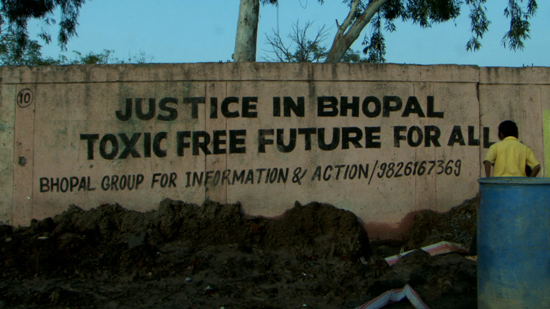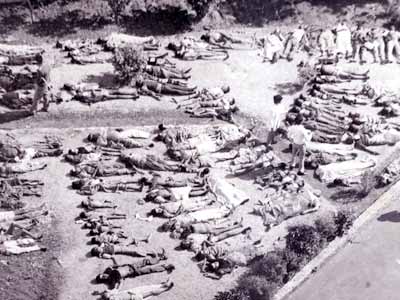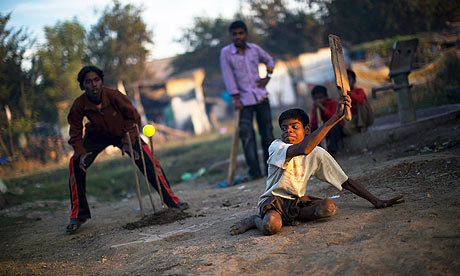Last night I and the Amnesty International UBC team headed over to the Norm theater to check out a film screening of the 2011 film Bhopali. This year marks the 29th anniversary of the US company Union Carbide (now owned by Dow chemicals) gas disaster in Bhopal, India in 1984. According to the film, more than 25,000 people and counting have been killed over the decades as a direct result from the disaster and more than 500,000 people have been affected in terms of contaminated water, birth defects, family deaths, or illness/infections. The film provided the historical background of the tragedy, as well as current attempts at community rebuilding, addressing the now 3rd generation of birth defects, and legal action on part of the Indian government and Dow/the US government.
As much as I would love to discuss legal justice for human rights abuses, that’s not quite what this class is about. So, I will bring up several interesting things about the movie related to commodification, globalization, and celebrity presence. First, the movie has been on a world tour since 2011, and is currently on a North-American specific tour. Next stop: New York City. Sanjay Verma, who was interviewed in the movie for his experience with the disaster in that 7 of his family members died when he was 6 months old and whose only brother committed suicide from the paranoid psychological effects of the chemicals, came out on stage after the movie for some Q and A. He explained that in order for Bhopal to get the justice it deserves, the tragedy needs to gain more support in places like the US and Canada so that the rest of the world will pay attention. Since the 30th anniversary year is approaching, he hopes that spotlighting Bhopal in the media will draw attention to the fact that neither the Indian government nor Dow chemicals has done much to compensate the affected Bhopal population nor have made any attempt to clean up the site. In fact, a German company offered to clean up the site a few years ago and bring the toxic waste safely into Germany for appropriate destruction. This did not end up working out unfortunately but it highlights the fact that the disaster is not only the responsibility of India and Dow, but also of the international community. The benefits of commodifying the film into Western media presence will surely be better than any subsequent generalizations about developing communities because no one will help them otherwise.
Speaking of the benefits of globalization, I don’t know about anyone else but this ASTU class is making me severely depressed about my position of Western privilege and the fact that I have been socialized (i.e. brainwashed) to think I’m superior to everyone on the planet. However educational it is to be aware of my position and my advantages, it’s pretty upsetting that we label Westerners as manipulative, selfish, demeaning people in every aspect of media and journalism. Take the 25 Whitest Things To Have Ever Happened example on Buzzfeed– ok, I get it, our generation makes a fool of itself and is oblivious to the needs of our international neighbors.
But after seeing Bhopali, after a speech by the famous activist David Suzuki and with representatives from the Bhopal effort, and after being informed that there’s going to be a fictitious-but-almost-true Hollywood movie in 2014 about Bhopal, I don’t feel bad. I feel enlightened. I feel proactive. I feel like part of the cause, like I’m contradicting my generation’s stereotype by actually getting out there, getting educated, and vocally supporting important movements for justice. As we recently discussed in Political Science, the lack of corporate social responsibility is what is truly damaging our rapidly developing world. In the film, Dow claimed that because of corporate liability complexities, the previous owner of Union Carbide Warren Anderson had zero legal responsibility after the disaster. He’s currently retired, chilling in a mansion on Long Island. Union Carbide agreed on a settlement with the Indian Government for some 400 million dollars, which only gives the victims of Bhopal about $500 a person, which is of course distributed in monthly rations of like 4 bucks. What the hell happened? Why is there no international law, no international initiative to address corporate responsibility for mass-scale deaths? Why are the water sources in old Bhopal STILL polluted, because obviously the population has no other place to get water? Imagine if you recently bore a child, and knowingly had to drink contaminated water which affected your breast milk? You’d be fully aware that you’re directly poisoning your child, and yet what other choice do they have? This situation is entirely current and relevant. Why have they been constantly denied cleanup and community resources?
While I have few solutions to these problems, at least I am aware. Being a proactive, educated, vocal individual completely cancels out the label of a Westernized, ignorant, conceited bigot. I honestly believe that the presence of celebrities like David Suzuki are extremely beneficial to causes such as the Bhopal movement, because the fact is no one is going to pay attention otherwise. You can show them starving, disabled children, or show tests upon tests about water quality, but no one is going to care unless it affects them personally or if they can relate. In this way, celebrity presence isn’t a bad thing because as long as justice is being served, it doesn’t matter how the media decides to get the story out there.

Bhopalis still fighting for justice

Mass deaths in 1984

Birth defects still largely affecting the population. Children born in Bhopal are 7 times as likely to have birth defects than the rest of India.
